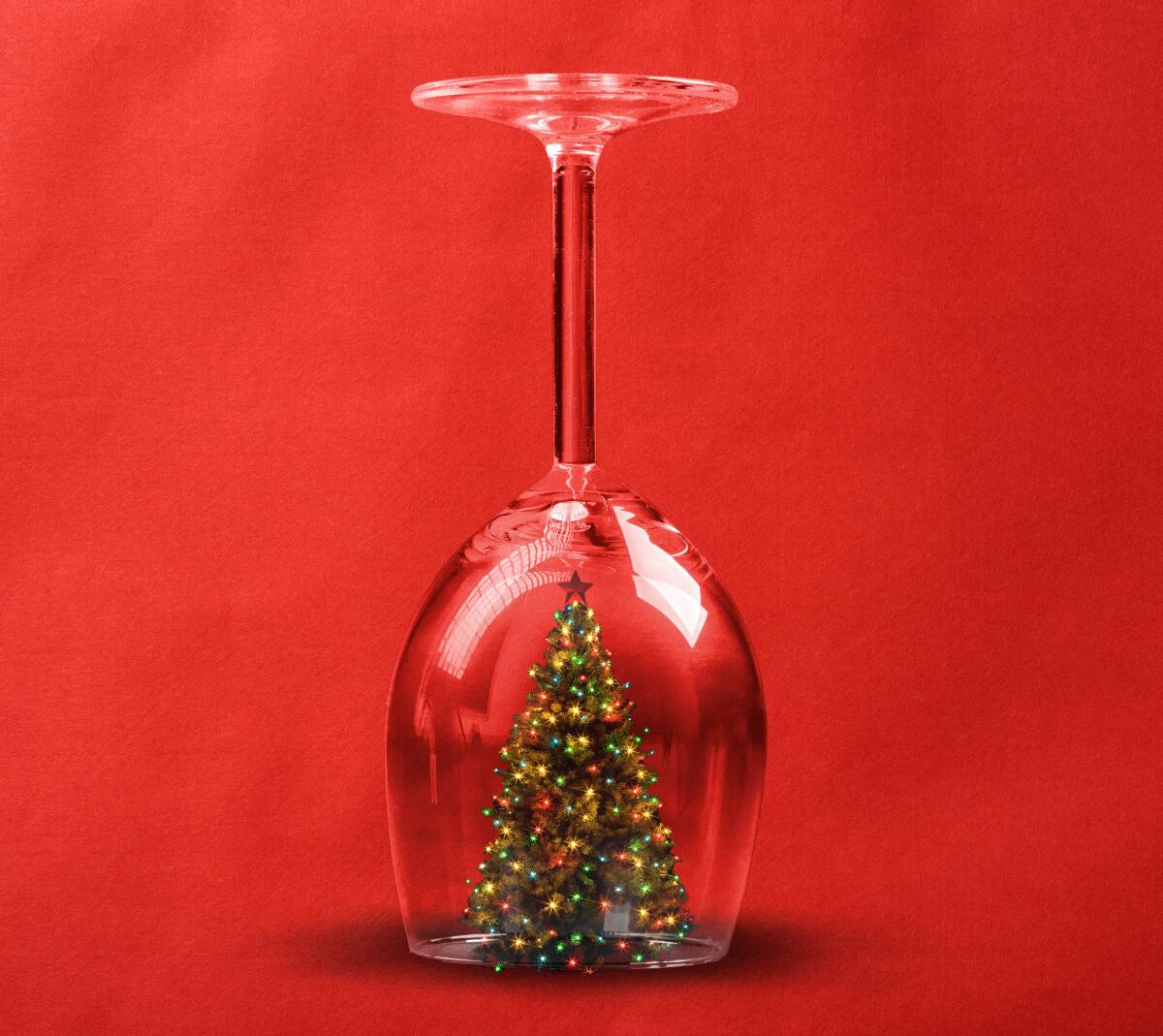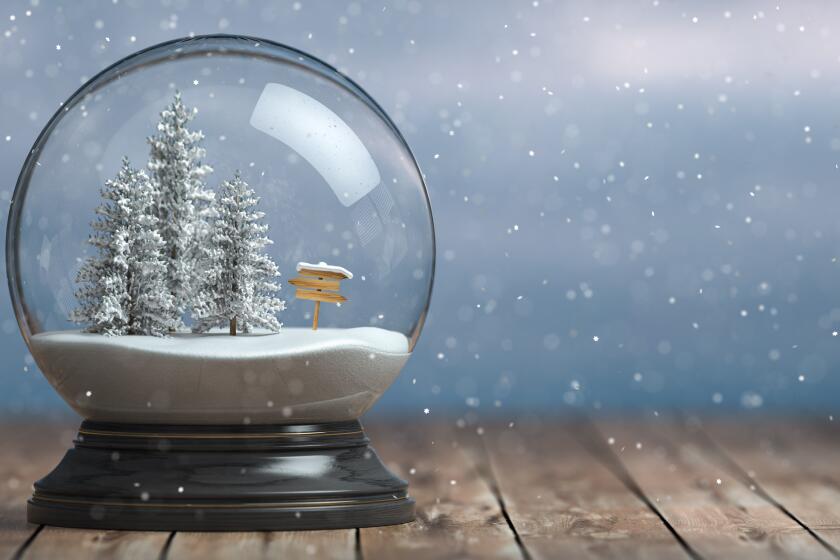Column: Staying sober this Christmas, or have a loved one who is? 12 tips to follow

- Share via
It’s that most wonderful time of the year, when tips on how to control your holiday drinking — people consume more alcohol between Thanksgiving and New Year’s than any other time of year — compete with lists of festive cocktails and boozy treats. Something for everyone!
I begrudge no one their holiday libations or liquor-drenched desserts. (After more than 20 years of sobriety, the only thing I truly miss from my drinking days are bourbon balls.) But for those of us who no longer consume alcohol, the holidays can be a bit of a minefield. For plenty of folks, “celebration” may involve a level of inebriation that can lead to awkward moments for those who do not partake. So here are a few thoughts for those in recovery and the people celebrating with them.
1. If you do not feel comfortable attending a gathering where many people will be drinking, and attempting to foist cocktails upon you, do not go. The fug of beer, the sight of so many shiny bottles, the circulating trays of Champagne can sometimes be too much, especially for those new to, or feeling shaky in, their sobriety. If you decide it will be fine only to discover, as the party hits mid-swing, that it is not, just leave. You don’t owe anyone an explanation. This is why the Irish exit was invented. (Well, probably not, but it’s definitely applicable.) Or you could simply cough a few times and put a hand to your forehead; then everyone will be happy to see the back of you. Either way, you are now free to eat cookies and watch “The Holiday,” which is way more fun.
2. If one of your friends or guests is not partaking of alcoholic beverages, please remember, because this is very important, it is absolutely none of your business. “Not drinking? But it’s Christmas/New Year’s!” “Still not drinking? Surely after [insert number here] years a little Champagne won’t hurt.” “Come on, have a real drink; wait, are you pregnant?” These are just a few of the wondrous and imaginative comments recovering alcoholics have heard approximately 1,657,842 times each and every holiday season. There are loads of reasons a person might be sticking to bubbly water, none of which he or she is required to disclose. Asking about it just sounds like the knee-jerk reflection of too many people’s belief that because they are drinking, everyone else should be too. Which brings us to…
3. Sober people are not sipping tonic water as a means to pass judgment on you and your multiple Negronis. Most of us have spent far too many mornings drenched in fear, shame, regret and vomit to pass judgment on anyone; we’re just grateful to be alive with functional brain activity, thanks. If you are someone fortunate enough to enjoy a cocktail or two, or the occasional bacchanal, without having it take over your entire life, well, good for you. Have all the fun in the world. Just please let us get you a Lyft.
4. When someone asks you why you are not drinking, you do not owe them an answer — see above — beyond the obvious “Because I don’t want to.” If you feel the need to explain further, the truth always works. And for those unfamiliar with the concept, identifying as “sober” or “a recovering alcoholic” does indeed mean that we do not consume alcohol. Like, any. No matter what the occasion. You wouldn’t suggest to someone with a nut allergy that they have a slice of pecan pie or a handful of candied walnuts “because it’s Christmas.”
The holidays can be brutal for children of alcoholics, especially amid a pandemic that traps families at home. But on a scary, snowy night decades ago, the chaos of my mother’s drinking finally gave way to a real Christmas miracle.
5. For those who need to hear it, Champagne is alcohol. So is beer.
6. Around the holidays, a lot of things that don’t come in glasses could very well be full of (non-heat-evaporated) booze. It would be lovely if such things were labeled but, as vegans and vegetarians know, that is often too much to ask and people in recovery are responsible for their own sobriety. From painful spit-it-out-on-my-plate experience, I have learned to ask about or simply avoid trifle, fruitcake, fudge, plum pudding, Christmas cake, tiramisu, ball-shaped cookies and, of course, chocolates shaped like liquor bottles and pretty much anything that is set on fire before being served. Gingerbread, mercifully, is usually nonalcoholic — though not, perhaps, the accompanying sauce.
7. Do not tell a sober person that booze in food “doesn’t count.” A bite of rum cake might not lead to drunkenness, but sobriety is a battle to achieve and requires rigor to maintain, and policing anyone’s consumption of anything is just bad manners.
8. Many sober people, including me, are fine with people bringing alcohol to any party or dinner they host. Others are not. When in doubt, just ask. And respect the answer.
9. There are loads of festive drinks and punches that can be made alcohol-adjacent. Those who want the booze can add it themselves. This is probably safer even for drinkers, anyway. Who hasn’t been felled by a couple of glasses of some innocent-looking punch that turned out to contain the alcoholic equivalent of jet fuel?
10. Everyone needs to hydrate throughout the holidays. Drinking isn’t the only thing that will keep you up until 2 in the morning singing, laughing and dancing, and there is nothing more irritating than waking up feeling that familiar headache and lassitude when you haven’t had a drink in 20 years.
11. Growing up in an alcoholic household can be deeply traumatic, particularly around the holidays. If you know a child in that situation, don’t look the other way. No one expects you to solve the problem, but providing an occasional nonchaotic space in their lives, with no judgment or expectation, would be the best holiday gift you could ever give. And if you suspect you have a drinking problem, don’t put off dealing with it until after the holidays. Jan. 1 has no intrinsic healing powers; any day an alcoholic decides to stop drinking is magic.
12. Have a happy and joyful holiday season in any and every way you can, even if it involves willingly drinking eggnog. Something, drunk or sober, I have never, ever understood.
More to Read
The biggest entertainment stories
Get our big stories about Hollywood, film, television, music, arts, culture and more right in your inbox as soon as they publish.
You may occasionally receive promotional content from the Los Angeles Times.












